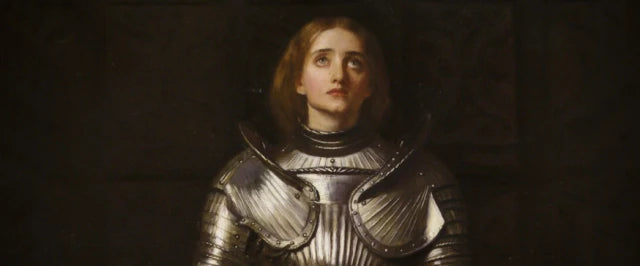
Saint Joan of Arc: A Symbol of Faith, Patriotism, & Courage
|
|
Time to read 5 min
|
|
Time to read 5 min
Saint Joan of Arc, the "Maid of Orleans," is a name that evokes images of unwavering faith, battlefield prowess, and a tragic end. Hers is a story that transcends the boundaries of history and religion, captivating imaginations for centuries. This teenage peasant girl, clad in armor and wielding a divinely-guided banner, became a pivotal figure in the Hundred Years' War, a brutal conflict between France and England.
Born Joan d'Arc in Domrémy, France, around 1412, Joan's life unfolded against the backdrop of a war-torn nation. The English held vast swathes of French territory, and the Dauphin, Charles VII, remained uncrowned king. It was during this tumultuous period that Joan, a devoutly religious young woman, began experiencing visions and hearing voices.
These pronouncements, which she attributed to Saints Michael, Catherine, and Margaret, instructed her to lift the siege of Orléans and lead Charles to his coronation in Reims. Initially met with skepticism, Joan's unwavering conviction and fervent belief in her divine mission eventually swayed the Dauphin's advisors.
Clad in white armour, a symbol of purity, Joan rode at the head of the French army, her presence boosting morale and inspiring her troops. Her military strategies, perceived as divinely guided, proved remarkably successful. Orléans was liberated, and Charles VII was indeed crowned king in Reims, a turning point in the war.
Joan's meteoric rise was short-lived. Captured by Burgundian forces allied with the English, she was subjected to a politically motivated trial overseen by English authorities. Accused of heresy and witchcraft, Joan faced a hostile court determined to discredit her and undermine French morale.
Despite her illiteracy and young age, Joan displayed remarkable composure during the trial. She defended her visions with unwavering conviction, refusing to renounce her beliefs. Ultimately, political expediency trumped justice. Joan was condemned and burned at the stake in Rouen in 1431, at the age of 19.
However, Joan's story did not end with her execution. Over two decades later, a retrial was held, clearing her name of heresy and witchcraft. She was canonized as a saint by the Catholic Church in 1920, solidifying her status as a national heroine in France.
But what makes Joan of Arc such an enduring icon? Here are some key aspects of her legacy:
The story of Joan of Arc continues to spark debate and intrigue. Was she a divinely-guided visionary, a shrewd military strategist, or a pawn in a political game? Perhaps the answer lies in the intersection of all these aspects. Regardless of interpretation, Joan of Arc's impact on history and her enduring legacy as a symbol of faith, courage, and patriotism remain undeniable.
Exploring Further:
Joan of Arc's story is a testament to the human spirit's ability to achieve the extraordinary. She continues to inspire artists, writers, and activists who find resonance in her message of unwavering faith, courage, and unwavering belief in a higher purpose.
Saint Joan of Arc's story transcends the boundaries of time. While her historical context remains significant, her legacy continues to resonate in the modern world in surprising ways:
Feminist Icon: In a world dominated by men, Joan's rise to military leadership challenges traditional gender roles. She defied societal expectations of a young woman in her time, becoming a symbol of female strength and defying limitations. Feminist movements continue to find inspiration in her courage and unwavering determination.
Mental Health Awareness: Joan's visions and voices have been interpreted in various ways, with some suggesting she may have experienced a form of religious neurosis. This perspective opens discussions about mental health and the importance of understanding and respecting those with different experiences.
Pop Culture Inspiration: Joan of Arc's image has been appropriated and reimagined in countless forms of popular culture. From video games to movies, her story continues to be retold and reinterpreted, engaging new generations with themes of heroism, faith, and defying expectations.
A Call for Social Justice: Joan's fight against foreign occupation and her association with the common people resonate with modern struggles for social justice. Her story inspires those fighting for equality and challenging oppressive structures, reminding us of the power of individual courage in the face of injustice.
Interfaith Dialogue: Joan's unwavering faith and her willingness to engage with figures of other faiths (as seen in her attempted dialogue during the Crusades) offer a message of tolerance and understanding in a world often divided by religious differences.
A Legacy for Our Times
Saint Joan of Arc's life and legacy offer valuable lessons for the modern world. She teaches us about:
Saint Joan of Arc's story is more than just a historical footnote. It's a timeless reminder of the human capacity for faith, courage, and the pursuit of a higher purpose. As we navigate the complexities of the modern world, her legacy continues to offer inspiration and guidance.